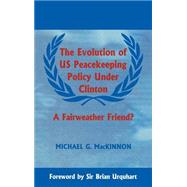The Evolution of Us Peacekeeping Policy Under Clinton
, by MacKinnon,Michael G.- ISBN: 9780714649375 | 0714649376
- Cover: Hardcover
- Copyright: 11/30/1999
This fascinating study examines the dynamic process through which the Clinton administration developed a policy towards UN peace support operations. The book explains, in an accessible way, why policy-makers in the administration eventually adopted such a different posture towards UN operations from the one they set out to write. In most respects, the policy enshrined in Presidential Decision Directive 25 (PDD 25) of 1994, was a far more restrained and cautious view of UN peace support operations than the Bush administration's policy which, ironically, was much criticized by Bill Clinton during the 1992 presidential elections. The author addresses the fundamental question: what factors influenced the shift in US policy towards the United Nations and its peace support operations - and which factors were clearly dominant? Based on primary sources and interviews with political personalities and officials, the author examines four main factors which shaped the development of policy: the Executivebranch, the bureaucracies (the State Department and Department of Defense), Congress and public opinion. These provide the basis for the core chapters of the book, which also contains a chapter on methodology and a chapter of summary analysis. The four factors are assessed through the lens of a 'political process model'. This model presents government decision-making as designed or influenced by a combination of several so-called power centres or political actors, such as the executive, advisers, the media and so on. In the case of US peacekeeping policy, and the emergence of PDD 25, it was domestic politics that prompted the shift in US policy. At the heart of the Clinton administration's backtracking lay a divergence between the Executive and Congress over foreign policy in general, but US policy towards the UN and the use of American military power abroad in particular. Rather than defend the fifty-year trend towards presidential prerogatives in these policy areas, Clintonabandoned a proactive UN policy in order to reduce Congressional criticism and husband his political capital for domestic policy initiative in order to secure re-election in 1996.







